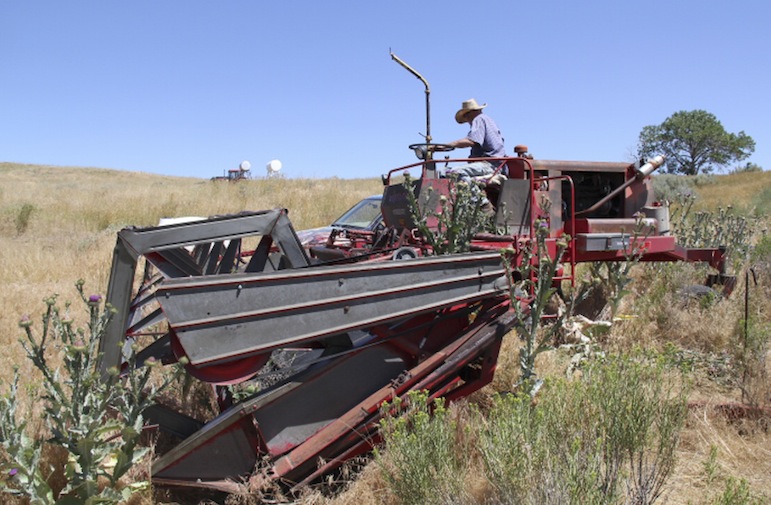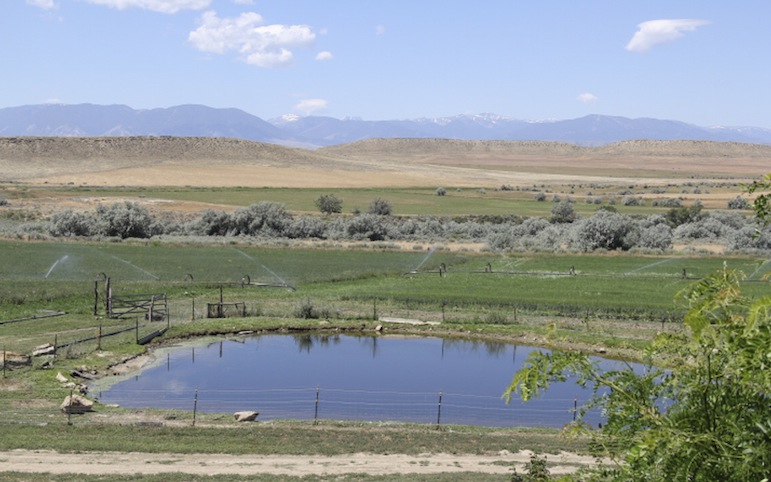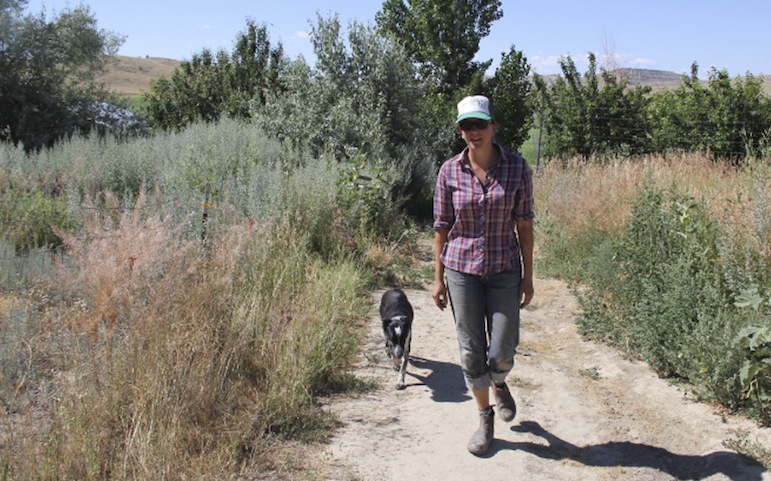
Ed Kemmick/Last Best News
Bradley Schuler uses a stirrup hoe to weed the main garden at the Wholesome Foods farm near Bridger.
BRIDGER — Marguerite Jodry was majoring in music at the University of Montana when she found her way into the local food movement.
She worked in Sheridan, Wyo., on an AmeriCorps-VISTA food project, then worked as an intern at the Amaltheia Organic Dairy in Belgrade, where she arrived amid the kidding season. “I was a goat midwife,” she said.
Last summer, she landed an internship at the Espenscheid Ranch and Wholesome Foods, an organic and sustainable farm a few miles south of Bridger.
“I slowly couldn’t imagine doing anything else,” she said.
She’s still working at the farm, where her internship turned into a full-time job as the assistant manager.
“There’s so much opportunity,” she said. “There are so few people doing what we’re doing. And the people who are doing what we’re doing are so excited to see a young person.”
The farm is owned by Dick and Patricia Espenscheid, who retired to the ranch from Chicago. Patricia had never been to Montana and had never worked on a farm before they went looking for a place in 1996. They bought the 1,000-acre spread near Bridger in 1997.
Dick and Patricia were both working for corporations in Chicago when they decided to move to Montana, but Dick had lived in Augusta years ago and his career had included ranching in South Dakota and owning a dairy and poultry farm in Wisconsin.

Ed Kemmick/Last Best News
Dick Espenscheid had worked as a farmer and rancher before joining the corporate world and he couldn’t wait to get back to the land.
He wanted to live in Montana again and get back to farming. They spent three weeks touring the state in 1996 before settling on the property in the Clarks Fork Valley.
Their goals — besides the joy of living and working on the ranch — are to promote healthy, organic food, to sell their food locally and to take care of the land. They also want to use the operation to educate young people about where their food comes from, and to interest them in farming as a way of life.
That’s why they have the internship program for college students, and why their farm is a destination for field trips. Red Lodge Schools’ Farm and Garden Camp brought children to the farm for straight four days this summer, and the Lockwood Boys and Girls Club brings out different groups of kids for field trips four times each summer.
You can’t teach much on a one-day visit, Jodry said, but you can give children a taste of farm life, and of real food.
“We let them eat as many weird vegetables as they will,” she said. “Kids will eat anything if they can pick it.”
After they bought the land and finished building a house there a few years later, Patricia moved to Montana. Dick stayed in Chicago, working for a construction supply business until everything was paid off, then finally moved here five years ago to get the farm and ranch running.
The novelty of what they were doing — especially the idea of serving local communities with their whole foods — created a lot of interest.
“Right from the beginning, people wanted to bring their kids out,” Dick said. He was only too glad to accommodate the requests.
“I was raised in the city, too, and hadn’t a clue where our food comes from,” he said.
One of their interns this year left prematurely, but Montana State University Bozeman student Bradley Schuler is doing an internship there now. In addition to Schuler, Jodry and the Espenscheids, the operation is staffed by Robin Taylor, the garden manager, who commutes from Red Lodge, and ranch hand Ivan Goepford, who lives on the ranch.

Ed Kemmick/Last Best News
Marguerite Jodry talks about the bumper crop of garlic grown in the passive solar greenhouse.
They’ve got about an acre and a half in produce, raising more than 35 varieties of vegetables in fields they rotate with barley and wheat. Crops include beets, carrots, potatoes, squash, green beans, onions, tomatoes, cucumbers, broccoli varieties, asparagus and herbs.
They also plant baby greens in the spring, have a greenhouse full of tomato plants and a passive solar greenhouse where they plant early garden starters.
“I was growing here in January,” Jodry said. The greenhouse has a wall of 5-mil clear polycarbonate panels facing south, and barrels of water on the north wall to soak up the heat by day and dissipate it by night. They had to use a propane heater a few times this winter, during streaks of sub-zero weather, Jodry said, but otherwise the passive solar was plenty.
The greenhouse was conceived and built by an intern last summer, Jodry said, and Dick Espenscheid gave him the go-ahead despite the young man’s inexperience. That’s one of the best parts about working on the farm, Jodry said.
“Dick is so supportive of the ambitions of the young people who work here,” she said.
Espenscheid, for his part, says one of the most important lessons he’s learned on the farm is “letting the younger ones take over. You’ve got to have vision and you’ve got to have energy. They have both.”
He’s still got vision, he said, but at 69 his energy isn’t what it used to be.
They also raise cows and pigs — about 50 of each this year — in addition to chickens, ducks, turkeys and geese. Their beef is grass feed and the pigs feed on certified organic wheat and alfalfa.
“Buying local means your meat is born, raised and finished all on one site,” promotional materials used by Wholesome Foods say. “Minimal transportation means a reduced carbon footprint.”

Ed Kemmick/Last Best News
The entrance to the ranch south of Bridger.
There is a manmade pond near the house, for the ducks and geese, and it is also there for fire protection and backup irrigation.
The Espenscheids are having a bank of solar collectors built near the house this summer, with a goal of reducing their own carbon footprint still further.
Everything on the ranch — animals, grains and produce — is raised free of chemicals, antibiotics and hormones. Patricia Espenscheid, who ended her nursing career working in administration for a big medical group, does all the paperwork to document and maintain their organic certification.
“This is an incredible amount of work,” she said as she leafed through a thick sheaf of documents.
The farm sells its produce and meat at the Farmers’ Market in Red Lodge and in Billings at the Healthy By Design Gardeners’ Market, held Thursdays from 4:30 to 6:30 p.m. in South Park.
They also sell to some restaurants, grocery stores and the Good Earth Market in Billings. Other sales are made through buyers’ clubs in Billings and Red Lodge, in which customers pay $30 to $35 every two weeks to receive a box of mixed produce.
Jodry said they’re still doing a lot of experimentation at the farm, both in what they produce and in what they sell. To succeed and be sustainable, they need to “rein in it” somewhat and find the best combination, she said.

Ed Kemmick/Last Best News
Patricia Espenscheid shows some of the documentation needed to maintain the farm’s status as a certified organic operation.
By next summer they hope to be selling their food wholesale through Market Day Foods in Bozeman.
Schuler, this summer’s intern, is settling into life on the farm. The Maryland native has been studying sustainable food systems at MSU for three years, after starting out thinking he’d major in wildlife management. He does weeding, harvesting, watering and taking care of the animals, and he likes being busy all day every day.
“It’s good to be totally committed to it,” he said.
Schuler and Jodry live in what they call the “intern camp,” where Jodry has an old trailer and Schuler a wall tent. They share a cook tent. Jodry was in a newer, larger fifth-wheel trailer, but it burned down in April, possibly from bad wiring on the furnace.
She lost most everything, including her accordion, but she was relieved that she didn’t lose her bicycle and her two pairs of work boots. Living in the Clarks Fork Valley tends to make you concentrate on what’s important.
Jodry said she loves working in the valley, which is as beautiful as it is bountiful. It can be brutally cold and scorchingly hot, with weeks of bone-dry weather punctuated by huge thunderstorms dropping inches of rain, but that’s all part of the experience.
“There’s something here that’s invigorating,” she said. “It’s the extremities … it keeps you on your toes. I’ll never come to take this place for granted because it’s never the same.”
More photos from Wholesome Foods farm:
Ed Kemmick/Last Best News permalink
A bank of solar panels is going up at the farm.







